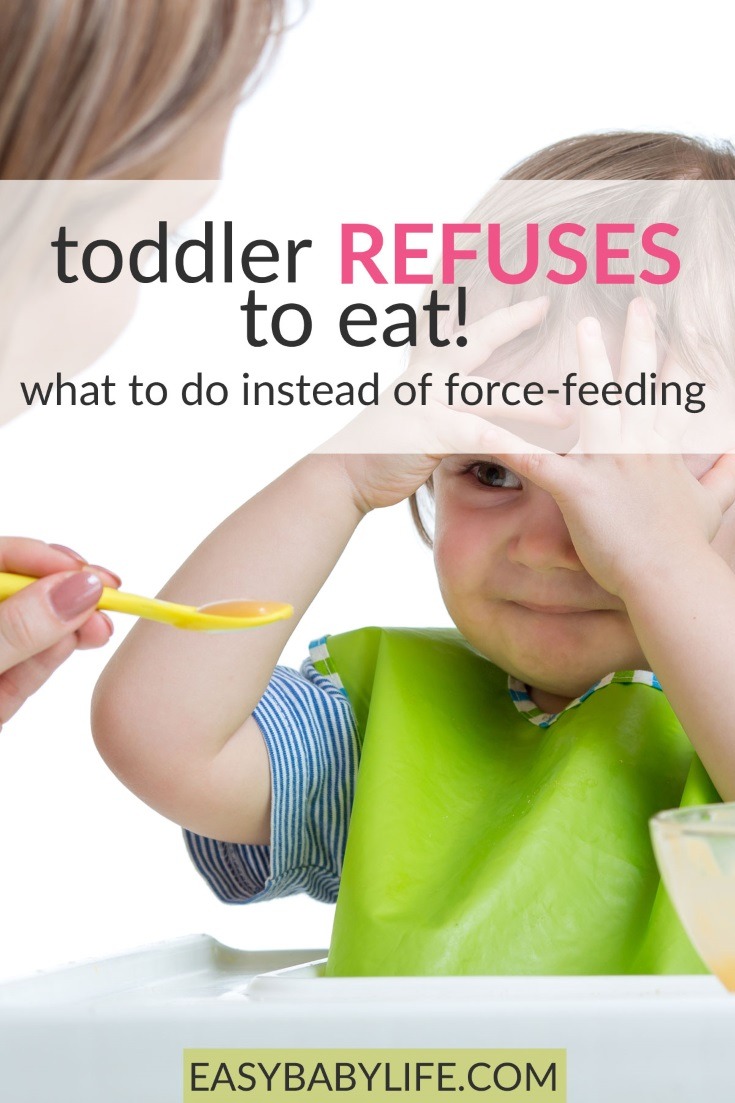What if your toddler refuses to eat? This situation is so common and can easily become a real power struggle.
Let’s stop the fight and focus on fun! Here are 7 great ways to get a toddler to WANT to eat!
Dad’s Question:
Basically, my toddler refuses to eat! My son is 18 months old and feeding him is a very tough job. He does not eat by himself and it takes both my wife and me to hold him and feed him by force. He is very picky and moody as far as eating is concerned. It gets us worried.
He also sleeps very little and always wants one of us beside him to sleep with. He is very active and wants to play and be carried all the time. Please advice.
Parenting Options When Toddler Refuses to Eat and Sleep
Regarding your questions, I can almost feel your frustration and worrying. I do have a few tips that might be of help.
First of all, it might be good for you to know that 18 months is a development stage. A lot happens in the mind and body of the young toddler at 18 months and that often means that the baby becomes a bit self-conscious, cranky, wakes up at night and generally wants to be in his parents’ arms a lot. Especially the night-waking can come as a big surprise for parents that have enjoyed quite undisturbed sleep for months. You can read more about toddler development milestones here.
Of course, just because it is normal it doesn’t mean that it is easy…
Tips to make eating enjoyable for toddler on a feeding strike
Now to your son’s meals, which seem to have become real power struggles.
I have a strong suggestion for you;
Completely stop forcing your son to eat! Forcing a toddler to eat, will only reinforce his impression that eating is something very unpleasant, that he definitely will have to fight. So it becomes a very vicious circle and he is way too young to break it. Only you can.
Instead of force-feeding, take a deep breath and try to do exactly the opposite! Do all you can to help him discover that eating can be fun and pleasant. Here’s what to do:
1. Foods he likes
Give him mainly foods that he likes. Now and then you can add a little something new on his plate and encourage him to try it. No force, no nagging, but big smiles and applauds if he dares to, even if he spits it out after 1 second!
2. Feed himself
Let him feed himself, no matter how greasy it gets, how long it takes and how little he eats. Many babies in his age and even younger simply hate being fed. Give him a spoon if he wants one and let him eat with it and his hands from a plate or directly from the table, whichever makes him the most content and interested in eating.
3. Have fun
Make it fun to eat together by talking to him and each other about pleasant things, singing and joking…
4. Leave if he wants to
If he wants to leave the table, let him. Offer him plenty of healthy snacks on the go between meals. (Just offer, no big deal if he rejects the fruit, vegetable or whatever you give him.)
5. Relax
If you’re worried that he won’t get enough to eat this way, try to relax. If your child is healthy, he will not starve himself. Add some oil or butter to his foods if he only eats a little bit. If he enjoys formula, you can give him an extra bottle in the evening (or even during the day, but never right before the solid foods) if you think he might be too hungry to sleep well.
6. Play games
Play feeding games! Feed mom, feed dad, feed Teddy but don’t feed the baby (unless he wants to). Hide bits of finger foods that he likes among his toys and let him find them together with you.
7. Let him help
Let him help out in the kitchen, by “doing the dishes” (i.e. splashing in water), rinsing the cucumber (“ohh – you want to taste it, sure go ahead”), putting spoons on the table or whatever he enjoys. Praise him and let him go get your spouse for dinner. But no eating for him unless he wants to.
The whole idea is to get rid of the built-up tension among the three of you regarding his eating. Chances are that your boy will slowly discover that eating can be nice.
And tips when your toddler refuses to sleep alone
Regarding his sleep situation as well as the fact that he wants to be carried around: To me, it sounds like a normal developmental stage. It can be very frustrating (and heavy) but it passes – and it passes more quickly if you stop fighting it and respond to his needs for security.
Try to make the nights as easy as you can by helping each other. Take turns attending to your boy, for example. Put an extra bed or mattress next to your bed and let him sleep there (or in your bed) if he has a hard time in his own room. Or at least make sure one of you can sleep comfortably next to him in his room. And during the day, hug him, cuddle him and make him feel loved as much as you can. That way his insecurity might pass faster. Before you know it, he will be a curious toddler again, ready for new adventures!
But back to the eating… Try to follow my advice above, I can assure you that the situation will improve!
To learn some more about children’s eating habits, click here.
Here you’ll find more tips on how to avoid power struggles at mealtime. (I still have to bite my tongue quite often, but these tips really work if you follow them.)
Finally, for some ideas on finger foods to give your son to encourage him to eat using his own hands, click here.
(Of course, if you are at all worried that your son’s reluctance to eat and his crankiness has anything to do with illness, take him to a doctor for examination.)
I wish you good luck!
Paula
Hey parents, if your toddler refuses to eat – what do ou do? Any tips or experiences to share?
Read Next
- What Should My Toddler Eat? Nutritional Needs and Guidelines
- 7 Tips If Your Toddler Stopped Eating; Choose Fun over Fight!
- The Best Iron-Rich Foods for Kids – Tips and 9 Easy Recipes

Paula Dennholt founded Easy Baby Life in 2006 and has been a passionate parenting and pregnancy writer since then. Her parenting approach and writing are based on studies in cognitive-behavioral models and therapy for children and her experience as a mother and stepmother. Life as a parent has convinced her of how crucial it is to put relationships before rules. She strongly believes in positive parenting and a science-based approach.
Paula cooperates with a team of pediatricians who assist in reviewing and writing articles.








Hi mums, this site has been a blessing. I live in Nigeria, West Africa where it is a shame to have a small baby. He hates food and clamps his mouth shut at the sight of food. Meal times are distressing, as I have to hit him to cry and gulp down his cereal. That’s normal here, but I hate it and need advice. He is so small that he wears 6mnth old clothes. Advice welcome. He was born 2.2kg.
Hi Nigo,
I am so sorry to hear about your situation. It’s so sad when culture makes people pass judgment on a baby’s appearance. Kudos to you who dare to question it!
I think one thing you should do is a health checkup on your son. If he is healthy, just small and skinny, then maybe you can relax and defend him instead of feeling bad when someone comments. Make yourself his warrior!
Secondly, hitting him will not make him eat more, rather the opposite, which you have probably already noticed. He will associate eating with something very unpleasant and it will all become a very vicious circle. Stop the hitting immediately and try to start following the advice above.
Make sure to read the articles about power struggles and children’s eating habits as well. If your struggles have been going on for a while, then don’t expect the situation to be solved quickly. It might take a month or two or even more – not just for your son, but also for you to learn how to feed him in a completely different way and actually trust yourself in the new situation. But you can make it! And you will have such a much more pleasant situation with your son!
Remember that he is only 11 months old – at this age, breast milk or formula should still be the main nutrition and solid foods, including cereal, should be for fun and learning a new “grownup” way to eat.
So take a deep breath and try new ways! If your son associates his high chair or the table with the power struggle, you might want to move the eating to some other place – even a blanket on the floor and some little finger foods hidden under a toy. Be creative and do something that puts a smile on your face too. 🙂 And give him plenty of breastmilk or formula after the solid “feedings” to make sure he gets the nutrition he needs.
Good luck!
18 months is a very difficult age. I have 2 daughters, ages 2 and 4, so I know how trying it can be.
18 months is the age where everything has the potential to become a power struggle. I’ve always found that with eating, letting your child be in charge is the best policy. You can decide what to serve, but always let your child decide how much to eat and whether he even eats at all. DO NOT force feed your child, as it just makes it worse at the next meal time. I would suggest stopping that for the next month.
Give him food at mealtimes as if you fully expect that he is going to eat it on his own, but don’t even say anything when he doesn’t. He will probably test you at first by not eating to see if you really mean this new laid-back attitude about mealtime–and you’ll probably be getting worried that he’s going to wither away. It’s amazing how little food 18-month-olds actually need to survive, and know that no kid has voluntarily starved themselves to death. Yours will be fine if you continue being laid-back about meals. He will grow out of it.
At bedtime, have you tried sitting in a chair in his room but not allowing him to sleep with you? He seems to want your company and your attention, and simply being in the room could satisfy his desires for that. Pick a good book and sit in a chair in his doorway until he falls asleep. Don’t talk to him, just tell him that it’s time to sleep. There may be a lot of crying and screaming as he gets used to this new routine, but it will pass.
Good luck!